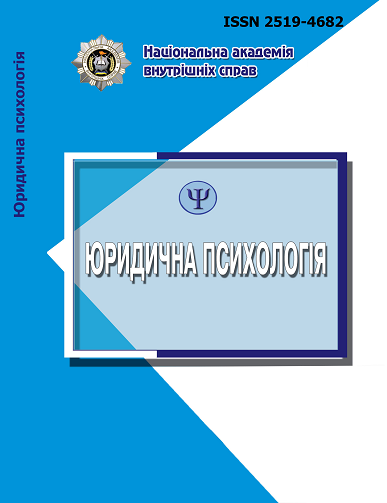The Main Factors of the Future Patrol Police Officer’s Professional Motivation
Keywords:
motivation, motive, patrol policeman, theory Y, motivation of affiliation
Abstract
The article deals with generally accepted theories of professional motivation in the world (A. Maslow, D. Mc Gregor, D. Mc Clelland). The driving factors that motivate people choose the profession of police patrol officer are indicated. The problem of motivation of professional activity at different times was quite important. It’s Exploring help store veal and explain the peculiarities of human behavior incerta in situations, the behavior of the person from the perspective, we are dealing with a short-term phenomenon or a long-term process. Motivation of the person in the patrol police units is sometimes very complex, including a combination of different motives (dominant and auxiliary that lead a person too solving various problems of professional activity). A serious studying of internal motives requires a hierarchically organized structure of employee attitudes to their duties in the context of needs. Basis of the motives of a person in police departments can be civil and patriotic sentiments; sense of social justice or social protest as a form of self-assertion; hostile attitude to wards criminality in general and/or concrete members of criminal organizations. The social orientation of the individual in such cases high lights by the content needs, including special place of spiritual need sin collective is plan reflection prosocial ideological and moral positions (when public interests coincide with personality, perceived social benefits of the activity, which increases strength, improves physical and mental activity). Motivating forces of patrol police officer’s activity are needs, attitudes, interests, beliefs, goals and etc. However, the definition of professional motivation may be determined by the degree of sat is faction (realizability) leading employee needs in professional activities. The presence of un met needs capable of generate the alarm, the consequence of could be an excessive emotional excitability vulnerability, low emotional stability, uncertainty in himself, impulsive in action and behavior, excessive desire for security that is manifest psychological deformation changes of the employee’s individual. There fore, duet of actors encouraging factors affecting employee consciousness, define specific line of his behavior, level of psychological readiness and mental conditions. So, we tried to use research and survey results predecessors primary training audience (specialization – the police personnel of the patrol departments) to identify the main driving factors of future patrol police officer’s professional motivation.Downloads
Download data is not yet available.
Abstract views: 195 PDF Downloads: 2565
Issue
Section
Psychological support of law enforcement
- Authors reserve the right to authorship of their own work and transfer to the magazine the right of the first publication of this work under the terms of the Creative Commons Attribution License, which allows other persons to freely distribute published work with mandatory reference to authors of the original work and the first publication of an article in this magazine.
- Authors have the right to enter into separate additional agreements on non-exclusive dissemination of the work in the form in which it was published in the journal (for example, to post an article in the institution's repository or to publish as part of a monograph), provided that the link to the first publication of the work in this journal is maintained.
- The journal's policy allows and encourages the posting of articles by authors on the Internet (for example, in electronic storehouses of institutions or on personal websites), both before the submission of this manuscript to the editorial office and during its editorial processing, as this contributes to the creation of a productive scientific discussion and positively affects the efficiency and dynamics of citing the published work.




